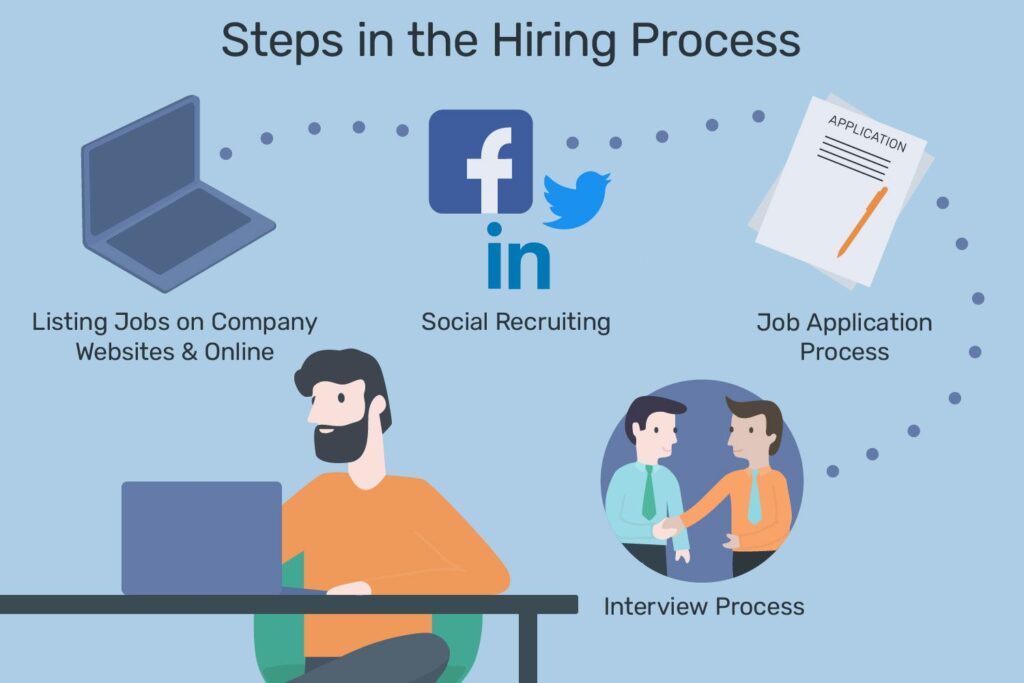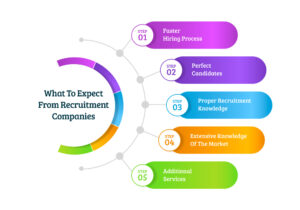A smooth-talking college sports team coach may be the first person that comes to mind when some hear the word “recruiter.” However, companies are looking for experts in other fields besides collegiate athletics to attract elite talent. Corporate recruiters all around the nation strive to find and draw in top talent in order to fill positions that businesses need filled.
Serving as a recruiter’s intermediary can be a fulfilling experience because they are frequently the one who connects candidates with their next opportunity. After all, there are many benefits to placing people in positions where they can develop professionally or increase their income. After all this information, you will think about what a recruiter does exactly. So, here you can get to know what a recruitment agency really is.
What does a Recruiter do?
Human resources (HR) is the field that includes recruiters. They are professionals at locating, interviewing, and drawing candidates for available jobs. Recruiter is in charge of the complete talent acquisition process. This may entail posting job openings, going through resumes, conducting interviews, and collaborating with hiring managers to identify the best fit.
It takes a lot of listening and communication skills to work with hiring managers, whether in-house or at recruiting agencies, to decide which qualifications, qualities, or prior experience should be given priority for a position that is open. The top recruiters are motivated to work with the team to identify a new hire who will complement the company’s culture and possess the skills needed for the role. Additionally, recruiters can assist hiring managers in getting ready for candidate interviews.

Since a recruiter is frequently a candidate’s initial point of contact with an organization, working with job candidates is a significant portion of a recruiter’s job description. This means that, particularly when they attend job fairs, recruiters frequently represent the company as a brand ambassador. Recruiters communicate with numerous job candidates concurrently. This could involve dealing with agreements and notifying rejected applicants that a different applicant has taken the position.
A recruiter from a nearby hiring agency is frequently the first point of contact in the competitive world of job hunting when looking for the ideal position. These experts are essential in helping companies find top talent and matching job seekers with suitable positions. By knowing the specifics of the local job market and customizing their approach to match candidates with the appropriate companies, a recruiting agency in your area becomes a valuable partner. Their knowledge goes beyond simply filling positions; they also serve as career counselors, offering individuals individualized advice as they navigate the job search process. Recruiters become the local allies who create a symbiotic relationship between employers and future workers in a world where the phrase “hiring agency near me” has great weight.
Tasks and Responsibilities:
Every wonder what responsibilities these recruiters hold? The duties and obligations of a recruiter can change based on the organization they work for and the people who need to be matched. Typical duties and responsibilities of a recruiter consist of the following:
- Creating and publishing job opportunities
- locating and getting in touch with possible job candidates
- Pre-screening applicants for jobs
- assisting applicants with their resumes
- introducing a potential employee to a hiring manager or employer
- arranging for interviews between employers and candidates
- negotiating over titles, responsibilities, and pay
Types of Recruiter:
In-house or corporate recruiter:
They are employed by a single organization, usually in human resources, and are in charge of filling positions that become available. Recruiters from within the company may work together with recruiters from outside agencies.
Agency recruiter:
They work at a recruiting agency and also work with different companies to fill-up the opening spot.
Executive recruiter:
They work as an executive search consultant to fill senior executive roles at different firms, usually at the C-level or above.
Outplacement executive recruitment:
They help displaced workers who require assistance refining their resumes and abilities after being downsized or laid off.
Temp agency recruiter:
They work for employment agencies to cover different companies’ temporary needs. Higher-level positions as well as lower-level positions may need to be filled. Occasionally, the candidates are temp or staffing agency employees who are sent to other businesses.
Skills for becoming a recruiter:
You might have an innate curiosity and interest in learning about people’s backgrounds, and you enjoy assisting others in discovering their skills and potential applications. Recruiting will highlight those interpersonal abilities. As a recruiter, it will also be beneficial to possess the following abilities:
Interview skills:
These skills are very important because a recruiter has to do a face to face interview or on phone with the respective employee for the job.
Negotiating skills:
They are important as the recruiter has to work with both the hiring manager and potential client for job responsibilities, job title and fair salary.
Persuasive skills:
If a recruiter has a persuasive personality then he/she is made for this job. Because as a recruiter, it is their duty to convince you to apply for a job opening or to make you consider that. They can also convince a hiring manager to interview a potential client for a job opening.
Human resource knowledge:
It includes a wide range of important abilities, including the ability to manage, hire, and motivate staff as well as conduct performance reviews.
Questions for recruiter:
In order to make sure that your working relationship with a recruiter maximizes your needs, here are some crucial questions you should put in their lap while looking for your next job:
- For what duration have you been hiring in this field? How is it doing with your present company?
- Which recruiting specialization do you have?
- Why do you believe I’d be a good fit for the position we are talking about?
- What are some of the most pressing issues that [the concerned organization] is now dealing with?
- What background information about the other applicants can you provide me with?
- In the last few months, how many people with my background have you assisted in placing?
- Could I have a conversation with a few of your past customers to inquire about their experience.
Conclusion:
Finally, recruiters are essential enablers in the ever-changing job market, driving professional development and company achievement. Their capacity to identify the distinct requirements of both employers and applicants, together with their acute comprehension of the dynamic labor market, establish them as essential collaborators in the recruitment procedure. In addition to making the process of finding talent easier, recruiters also help people advance professionally by providing insightful advice. Recruiter become essential linkers in a time when matching opportunities and talents is critical, skillfully integrating talent and ambition into the fabric of successful companies. Recruiters are gatekeepers of the job market, and as such, they have a significant influence on how careers are shaped, with their knowledge serving as a pillar in the dynamic story of the professional path.





